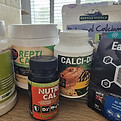
Diet
Essential insights into creating a healthy, species-specific diet to keep your tortoise thriving.
Why Diet Matters...
Tortoises are primarily herbivores, meaning their diets consist of mainly fibrous, nutrient-rich plants.
A balanced diet for your tortoise supports proper digestion, strong bones, and healthy shell growth. This prevents common problems like metabolic bone disease, digestion issues, and even obesity.

General Dietary guidelines
What you should know about a tortoise's diet, including what is good for them and what you should avoid.

High Fiber
Focus on fibrous plants, fibre aids digestion and supports a healthy gut.

Variety
Offer a wide range of diverse and safe plants for balanced nutrition.

Hydration
Despite getting moisture from food, tortoises also need fresh water access and bathing to ensure they are fully hydrated.

Protein Management
Avoid high protein foods to prevent problems like shell or kidney issues (read below if you have a tropical species!)

Calcium
Provide calcium-rich foods or supplements to support shell and bone health.

Avoiding Toxic Foods
Avoid toxic/harmful foods such as rhubarb, avocado, foxglove, and ivy.
Species-specific Diets
Tortoise diets are dependent on their natural habitats:
Mediterranean, desert, tropical, or grassland.
Common species include:
Hermann's, Sulcata, Red-Footed, and Leopard tortoises.
Mediterranean and Grassland
(e.g. Hermann's, Greek, Russian, Leopard)
Diet:
Leafy greens, grasses and edible flowers.
Calcium:
Offer collard greens or calcium powder 1-2 times weekly.
Avoid:
High-protein foods and fruits outside of small quantities.
Tip:
Control portion sizes to prevent rapid growth or obesity.
Desert
(e.g. Sulcata)
Diet:
Dry grasses, weeds and limited greens.
Calcium and Hydration:
Use calcium supplements and soak weekly.
Avoid:
Sugary fruits and high-oxalate greens.
Tip:
Despite species like Sulcatas being large, it is important to be aware and avoid overfeeding them.
Tropical
(e.g. Red-Footed)
Diet:
Greens, vegetables, limited fruit (10-15% of diet) and occasional protein.
Avoid:
Toxic plants and excessive fruit.
Tip:
Provide variety to mimic omnivorous habits. Mealworms are a great source of protein given in moderation to support your tortoise's diet.
Examples of Safe and Unsafe Foods

A list of foods you should and should not feed your tortoise.
Make sure to be aware of your tortoise's species and their dietary differences before feeding them anything. You should also keep in mind that your tortoise might have favourite foods and foods they don't like, no matter its species!
Foods you CAN feed your tortoise...
Plants
You can feed your tortoise...
Dandelion, clover, chickweed, plantain, heather, sow thistle, hawk bits, bindweed, rose petals, forget-me-not, fuchsia, antirrhinum, hibiscus, aubrietia, nasturtium, pansies, petunia, geranium, bitter cress, black medic, blue sow thistle, bristly oxtongue, broadleaf filaree, wild chicory, creeping thistle, dead nettle, field madder, globe thistle, goats beard, ground elder, hawks beard, hedge woundwort, kidney weed, knapweed, mallow, oilseed rape, scotch thistle leaves, sea holly, teazle, violet, bergamot, bromeliad, dahlia, evening primrose, hollyhock.
You MUST be aware that some foods that are considered 'safe' for your tortoise can only be fed in moderation and sparingly. Read below for information on how to know the amount of a particular plant, fruit, or vegetable you can feed your tortoise.
Vegetables
You can feed your tortoise...
Cabbage, spring green, carrot, cauliflower, spinach, Brussels sprout, cucumber, kale, cress, watercress, parsnip, fennel, rocket, chard, courgette, endive, frisée lettuce/curly endive, marrow, pak choi, pumpkin, radicchio, lollo rosso lettuce, romaine lettuce, and lambs lettuce.
Fruits
You can feed your tortoise...
Apple, pear, grape, strawberry, melon, plum, peach, blackberry, apricot, gooseberry, and raspberry.
Foods you CAN'T feed your tortoise...
Plants
You cannot feed your tortoise...
Lupins, daffodils, hydrangea, lily of the valley, foxglove, mistletoe, rhododendron, hellebores, crocus, bleeding heart, ragwort, azalea, vinca, hypericum, peony, lobelia, aconite, tobacco plant, Euphorbia's, and ivy.
Vegetables
You cannot feed your tortoise...
Aubergine and chilli peppers.
Fruits
You cannot feed your tortoise...
Avocado and rhubarb.
Information on this section was justified by Tortoise Centre (Thank you!)

Best Practices
Every tortoise is different. There are a number of ways you can care for your pet, but the most common methods of care are as follows:
Feeding:
Offer food equal to your tortoises shell size but understand growth patterns depending on their species and regularly monitor their growth and health to best estimate portion sizes. Scattering food rather than placing it in one area can also promote their natural foraging behaviour and encourage exercise. Additionally, high-quality pellets such as Mazuri or Zoo Med are a useful addition as a supplement to ensure your tortoise is receiving essential nutrients, especially when food sources are limited.
Hydration and Bathing:
Bathing/soaking your tortoise on a regular basis, especially if kept indoors under heat lamps, is essential. It is recommended to bathe your tortoise at least once a week (or more frequently the younger they are) to keep them hydrated. You should also leave a shallow dish of water for your tortoise that they can drink from and bathe in.
Substrate:
Avoid sand or gravel to prevent impaction. Instead, use a natural soil-based mix for your tortoise to allow digging and burrowing. Substrate, especially when combined with materials like coconut noir, helps to maintain humidity and comfort in their environment.
Monitoring Health:
Make sure, as previously mentioned, you are regularly keeping on top of your tortoise's health. Check for lethargy, wet or runny eyes, behaviour or appearance changes, and shell cracks/bumps, softness or deformities. You should also ensure their nails are kept trimmed to the correct length and their beak is properly formed. If required, contact your local vet, or a reptile/specialised vet if you have access to one.
A Word Of Advice...
A helpful app you can use is The Tortoise Table Plant DB. This app makes feeding your tortoise easier by showing you which foods are safe or unsafe and when a specific food can be fed regularly, in moderation, or not at all. There is no subscription required, making it a free useful tool for anybody who owns a tortoise!



